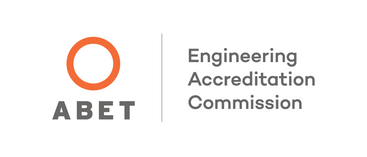ABET
The Bachelor of Science in Mechanical Engineering (ME) Program is accredited by the Engineering Accreditation Commission (EAC) of ABET, under the commission’s General Criteria and Program Criteria for Mechanical and similarly named Engineering Programs.
Curriculum Overview
The curriculum is structured so that most of the required courses in mathematics and the basic sciences (physics and chemistry) are completed during the first two years. In addition, two four-unit courses, Introduction to Mechanical Engineering and Engineering Graphics & Design, are offered in the first year. These classes focus on basic engineering concepts and computational engineering tools required for mechanical engineers. Engineering topics are covered primarily in courses offered during the second, third, and fourth years. Additional science topics (Biology) are covered in the third year. Students may also take elective courses in specialized topics such as Applied Finite Element Methods, Transport Phenomena in Living Systems, Vibrations, Environmental Impacts of Energy Production, Mechatronics, Combustion and Energy Systems, Optics and Lasers in Engineering, etc., in the senior year.
Several ME courses, including laboratory courses, incorporate design. Design addresses real-world problems whose solution requires creativity and consideration of alternatives to achieve stated objectives. The design component can occupy a significant fraction of course time and is usually conducted in teams. The culmination of the students' design experience is a three-quarter capstone design course, in which students draw upon various aspects of their previous engineering science and design knowledge to address a meaningful design problem. The first quarter focuses on engineering economics, engineering/professional ethics, and review of fundamental design concepts. In the second quarter, project (concept) analysis, preliminary evaluation (economical and technical), data and literature collection, and preliminary process design and evaluation is carried out. The third quarter of the capstone design course focuses on the final detailed technical design of the process (equipment sizing and specification, etc.), followed by prototyping and construction of hardware, and detailed technical analysis of the final design. The course concludes with a formal oral presentation and written technical report.
Focus Areas
- Materials and Structures
- Sixteen (16) units of technical electives chosen from ME 100B, ME 116B, ME 121, ME 122, ME 134, ME 153, ME 156, ME 180, ME 197
- Energy and Environment
- Sixteen (16) units of technical electives chosen from ME 100B, ME 116B, ME 117, ME 136, ME 137, ME138, ME 197
- Design and Manufacturing
- Sixteen (16) units of technical electives chosen from ME 121, ME 122, ME 130, ME 131, ME 133, ME 140, ME 144, ME 145, ME 153, ME 156, ME 175D, ME 176 , ME 180, ME 197
- General Mechanical Engineering
- Sixteen (16) units of technical electives chosen from selected from the following list, in consultation with an advisor: ME 100B, ME 116B, ME 117, ME 121, ME 122, ME 130, ME 131, ME 133, ME 136, ME 137, ME 138, , ME 134, ME 140, ME 144, ME 145, ME 153, ME 156, ME 175D, ME 176, ME 180, ME 197
Program Educational Objectives
ME at UCR is nationally recognized as an innovator in research and education in mechanical engineering. The foundation of the specific objectives of the undergraduate Mechanical Engineering program has been guided by the strong belief that the program should provide an equivalent of liberal arts education for the 21st century.
The Mechanical Engineering Program Educational Objectives are to prepare our graduates to make a positive impact on society by being successful in:
• careers as mechanical engineers and engineering leaders
• graduate studies and research
• professional careers besides mechanical engineering
• advocating the engineering profession and inspiring others to develop a passion for the engineering profession
Student Outcomes
Our goal for our graduates:
(1) an ability to identify, formulate and solve complex engineering problems by applying principles of engineering, science, and mathematics
(2) an ability to apply engineering design to produce solutions that meet specified needs with consideration of public health, safety, and welfare, as well as global, cultural, social, environmental, and economic factors
(3) an ability to communicate effectively with a range of audiences
(4) an ability to recognize ethical and professional responsibilities in engineering situations and make informed judgments that must consider the impact of engineering solutions in global, economic, environmental, and societal contexts
(5) an ability to function effectively on a team whose members create a collaborative and inclusive environment, establish goals, plan tasks, and meet objectives
(6) An ability to develop appropriate experimentation, analyze and interpret data and use engineering judgment to draw conclusions
(7) an ability to acquire and apply new knowledge as needed using appropriate learning strategies
Graduation and Enrollment Data
In the Fall of 2023, total undergraduate enrollment in Mechanical Engineering was 692 students. In the Spring of 2023, 120 Bachelor of Science degrees were awarded.
